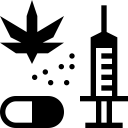Driving while under the influence of drugs (illegal, prescription, or otherwise) can make driving a car unsafe—just like driving after drinking alcohol. Drugged driving puts not only the driver but also passengers and others who share the road at risk. This includes driving while under the influence of marijuana.
Why is drugged driving dangerous?
Different drugs have different on the brain and can impair driving differently. Marijuana, for example, can slow reaction time, impair judgment of time and distance, and decrease motor coordination. Drivers under the influence of cocaine or methamphetamine can be aggressive and reckless when driving. Certain kinds of sedatives can cause dizziness and drowsiness, which can lead to accidents.
Substantial research has shown the negative effects of marijuana on drivers, including an increase in lane weaving, poor reaction time, and failure to pay attention to the road.
How many people take drugs and drive?
According to a recent National Survey on Drug Use and Health (NSDUH), an estimated 9.9 million people aged 12 or older reported driving under the influence of illicit drugs (including pot, per Federal law) during the year prior to being surveyed. By comparison, in 2013, an estimated 28.7 million people reported driving under the influence of alcohol at least once in the past year (SAMHSA, 2014). Furthermore, NSDUH data shows that men are more likely than women to drive  under the influence of drugs or alcohol and that a higher percentage of young adults (aged 18 to 25) drive after taking drugs or drinking than adults 26 or older.
under the influence of drugs or alcohol and that a higher percentage of young adults (aged 18 to 25) drive after taking drugs or drinking than adults 26 or older.
After alcohol, marijuana is the drug most often linked to drugged driving. In the 2013-2014 National Roadside Survey, 12.6% of drivers on weekend nights tested positive for THC, marijuana’s active ingredient. If you have been injured by a driver who was under the influence of pot, you have legal rights. Talk to an experienced auto accident attorney about your rights and your potential for financial compensation for injuries suffered. Potential monetary recovery includes lost wages, medical bills, hospital visits, rehab, and more.
For more information on how to file a claim against a driver who hit you while he/she was under the influence of drugs or alcohol, contact Woodland Hills attorney Barry P. Goldberg today for a free, no obligation consultation.







